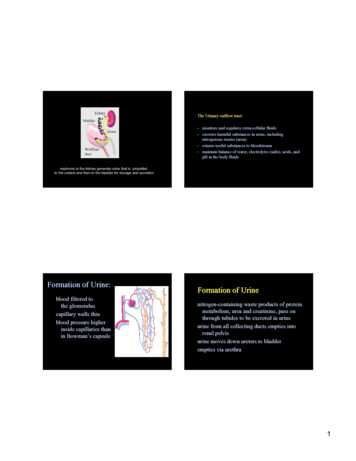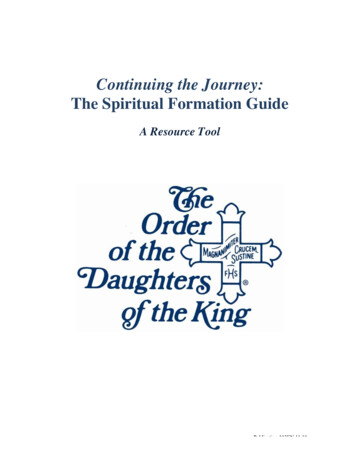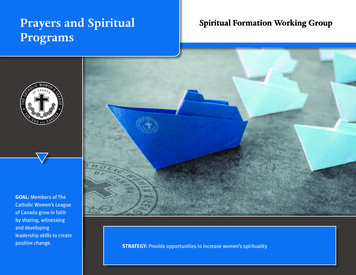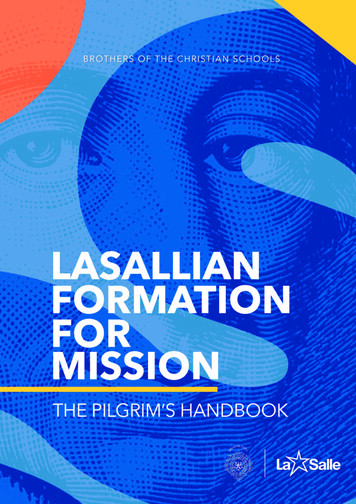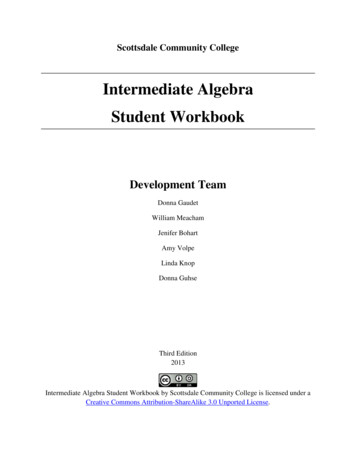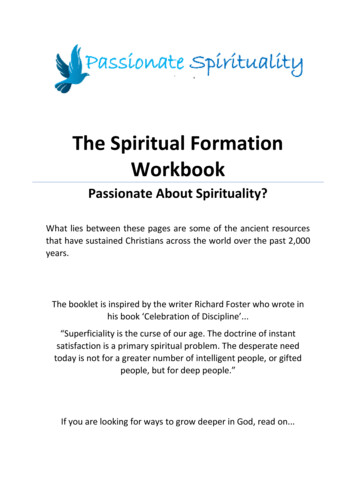
Transcription
The Spiritual FormationWorkbookPassionate About Spirituality?What lies between these pages are some of the ancient resourcesthat have sustained Christians across the world over the past 2,000years.The booklet is inspired by the writer Richard Foster who wrote inhis book ‘Celebration of Discipline’.“Superficiality is the curse of our age. The doctrine of instantsatisfaction is a primary spiritual problem. The desperate needtoday is not for a greater number of intelligent people, or giftedpeople, but for deep people.”If you are looking for ways to grow deeper in God, read on.
ritual Formation in the Mission-Shaped ChurchA Spiritual MOT- History- Your present situation- The FuturePrayer- Where to begin- Prayer and the Bible- Prayer at the end of the dayThe Practice of the Discipline- i)Scripture- ii)Supplication- iii)Silence- iv)Study- v)Service- vi)Sharing- vii)StewardshipThe Litany of ReconciliationJournallingThe Bible- Thinking of reading the Bible- Making sense of the Big Book- Taking time out with God- Praying through Scripture- Lectio Divina- Reading Plans (30 days for new Christians)- Using Spiritual Passages- Praying the Scripture through Imagination- A template you can use for Bible study- Still Waters- Spirituality in Daily Lives- Rule of LifeSpiritual DirectionThe Daily 7282829313133343637394951532
Spiritual Formation in the Mission-Shaped ChurchSection 1Introduction Why do so few people realise how deeply loved they are by God? How can we come to realise more deeply how much God truly loves us? How can the church express and demonstrate more fully God’s deep love for the world?The spiritual adventure of discovering God’s love can be found in three places.Solitude:Jesus invited His disciples to come away with him to a lonely place.Scripture:Peter says, ‘Where else can we go, You have the words of eternal life.’Service:Jesus said ‘I did not come to be served but to serve, go and do likewise’.I believe a life infused with these three ingredients is a godly life; something we are all called to livemore deeply. The hallmarks of such a life are these three qualities.Holiness:it is a life centred on the life and teaching of Jesus Christ.Humility:it is a life lived upon a trust in the grace, forgiveness and love that Jesus Christhas for each of us.Hospitality:the longer I live, the more I look into scripture and observe the lives of the trulygodly – it is a life open and available to others in a free, generous and kindspirit which is deeply inspiring and attractive.Helping people to become more aware of God’s deep love for them is a big challenge, even if easy tosay, but a necessary one to undertake if the Christian life of our churches is to continue to developas it should. In seeking to make ourselves and others more fully Christian, we should remember theold prayer which says, ‘Yes Lord, and begin with me’.1
Spiritual Formation in the Mission-Shaped ChurchSection 2A Spiritual MOTHistoryBeginnings.Think back to when you were first aware of being on the journey of faith. When and how did youbecome a Christian?The journey so far.What have been the most difficult or testing times so far?Think of two or more major milestones or highlights along the way. Why were these important?In what ways do you feel God has equipped you to serve Him?2
Spiritual Formation in the Mission-Shaped ChurchSection 2Your Present SituationIn relationship with God.What are the positive factors in your relationship with God?What, if anything, is hampering your relationship with Him?What do you think might help?Do you have a sense of God’s calling in your life? If so, what is it?3
Spiritual Formation in the Mission-Shaped ChurchSection 2Home, friendship and family.How settled is your home life? Are there any aspects you would like to be different?Who are your closest friends?In what ways do such relationships help or hinder your relationship with God?Where do you meet people who are not yet Christians?4
Spiritual Formation in the Mission-Shaped ChurchSection 2Occupation.What is your occupation (the main activity you undertake, which is not a leisure activity or a hobby)?On a scale of one to ten, ten being extremely satisfying, how satisfying do you find your occupation?You may want to explain your answer.How does faith affect your occupation?5
Spiritual Formation in the Mission-Shaped ChurchSection 2Hobbies/interests/relaxation.If you had a whole day just for yourself, how would you choose to spend it?To what extent are you content with the balance between occupation and relaxation in your life?Is there a leisure activity that you would like to try?6
Spiritual Formation in the Mission-Shaped ChurchSection 2The FutureThe future.Looking ahead five years, are there aspects of your life that you would like to be different? If so,what are they?What would be the most exciting thing you can imagine God asking you to do?What would be the hardest thing you can imagine God asking you to do?Practicalities.Are there any other relevant matters, not covered by the above questions that you would like todiscuss?7
Spiritual Formation in the Mission-Shaped ChurchSection 2Action points.Use this space for your action points after you have reflected on your answers with someone else.8
Spiritual Formation in the Mission-Shaped ChurchSection 3PrayerWhere to begin?God communicates His presence to us through the whole fabric of life but nearly always shyly. Godis always coming towards us, at every moment. Our task is to be more attentive to the coming, tolisten between the lines, to catch the silent music.‘He may be hidden but He is not hiding.’“The very moment you wake up each morning, all your wishes and hopes for the day rush at you likewild animals. And the first job each morning consists of sharing them all back and in listening to thatother point of view, letting that other larger, stranger, quieter life come flowing in. We can only doit for moments at first. But from those moments the new sort of life will be spreading through oursystem because now we are letting Him work at the right part of us.”C. S. Lewis“Lord, let your blessing be upon me as I begin this day with You. Confirm me in the truth by which Irightly live. Confront me with the trust from which I wrongly turn. I ask not for what I want but forwhat you know I need as I offer this day and myself for You and to You.”IonaPrayer and the BibleTake either a chapter of one of the gospels, Paul’s letters or one of the Psalms each day.1. Read slowly and attentively, until a phrase or word or a whole verse arrests you. A phrasemay pop up and ask to be taken more seriously.2. Reflect – chew on this particular morsel, repeat it, roll it around in the mind, look at it fromthis way and that, repeat it again, gently suck all the goodness out of it. Allowing the meaningof the phrase to sink slowly from your head to your heart. Don’t force it; just let thesignificance of those words emerge naturally within, you, taste the good news.3. Respond – when this process has come to a natural end move into praying the thoughts andinsights which have welled up inside you. This may mean you want to give thanks, or saysorry, or make a resolution before God, or simply carry a burden silently to Him.4. Rest – this is the stage of stillness that flows out of prayer as the words run out and rest andsilence take over.Prayer at the End of the DayFor many people this is a good time to pray because there is plenty of stuff to pray about. In particularthis is a good time to review the day, to see it in the light of God and so perhaps to grow in personal9
Spiritual Formation in the Mission-Shaped ChurchSection 4and spiritual awareness. By looking back at the day thoughtfully and prayerfully we can becomemore aware of God’s footprints through the day and can grow to know ourselves better.1. First be still and remember God.2. Ask God to shine His light over the day and into your heart so you can see clearly what is goingon.3. Think through the day not just in the events, but also your feelings. Where were you joyful,sad, fearful, angry, confused? Why might that be?God guides us through our moods and feelings. Normally, when emotions surface, as we notice whatis just under the surface, like tides under the waves, God can speak to us about our true state andthe truth of our lives.Think about what you did well today and give thanks. Also think about where you turned away fromGod at particular points and ask for forgiveness and new strength.“God, grant me the grace to accept with serenityThe things I cannot change,Courage to change the things I can,And wisdom to know the difference,Living one day at a time,Accepting hardship as the pathway to peaceTaking as You did this sinful world as it is,Not as I would have it,Trusting that You will make all things right,If I surrender to Your will,That I may be reasonably happy in this life,And supremely happy with You forever in the next.”Reinhold Neibuhr10
Spiritual Formation in the Mission-Shaped ChurchSection 4The Practice of the DisciplineA Coventry Way is a common discipline, which is intended to be a structure to help us love God, oneanother and the world. These common factors should characterise all Christian people. It does notrequire of those who share it anything harsh or additional to what should be normal, honest Christianbelief and behaviour. However, the particular yeast that permeates each discipline is Reconciliation.It is a basis to which can be added variations and details according to the circumstances andpreferences of each member.A Coventry Way calls for seven personal commitments. These may be summed up in the seven ‘S’s.They can be practised daily or assigned particularly one to each day of the onSilenceStudyServiceSharingStewardshipEach of them should be explored and lived out under the particular banner of Reconciliation. Let ustake each in turn:i) Scripture“All Scripture is inspired by God and is useful for teaching, for reproof, for correction and fortraining in righteousness, so that everyone who belongs to God may be proficient, equippedfor every good work.”2 Timothy 3 v16-17Following A Coventry Way involves commitment to the devotional reading of scripture andresponse in prayer. How this will happen must vary according to the circumstances of life.Those commuting to work, or with young children keeping them awake at night, or retired oreven ill, will all find different routines. The essence of the commitment is regularity.The devotional reading of Scripture is more than studying the Bible. It is the process oflistening to what God says to us through it. To do this we need to read systematically, eitherusing our own scheme or one someone suggests, spend time reflecting on the passage andthen seek to apply its truths to our lives and our world.11
Spiritual Formation in the Mission-Shaped ChurchSection 4Practical Tips--ii)Many people who commute read the Bible and pray on the way to work. Oneperson goes to a Benedictine monastery for the weekend before Lent. Anotherwakes in the night and prays for an hour before going back to sleep. It is all amatter of what each person can manage, given their lifestyle.If possible use a system for reading the Bible, published by someone like theBible Reading Fellowship or Scripture Union, or on the Internet atwww.365promises.com or www.wordlive.orgSupplication“Ask and it will be given you, seek and you will find, knock and the door will be opened toyou.”Matthew 7 v7Reading the scriptures will always lead to and intermingle with prayer. This will usually startwith praise and thanksgiving. It may lead to confession but it should include supplication.Supplication is a form of prayer bringing specific requests to God. This should cover not onlyour own circumstances and people around us, but take in items on the news and situationsfar away. It may be based around a formal book of prayer or be spontaneous and impromptu.All Christians should also be encouraged to seek one person with whom they can meet andpray. This may be a sentence of prayer with a spouse before sleep or a regular meeting witha friend.-Be short.Excessive ambition is the enemy of prayer.Read a little. Talk a little. Pray a little.Some may want to seek out those who can guide or direct us spiritually, perhaps meetingwith them every few months.Above all, be thankful for the reconciliation that we have through Christ, whatever we havedone, whenever we turn back to Him in repentance. In the knowledge and experience of Hisforgiveness which we strengthen through Scripture and prayer, we become better equippedto forgive others.12
Spiritual Formation in the Mission-Shaped ChurchSection 4Practical Tips-iii)Make and use a list of items for prayer.A church may be a good place for a half day of quiet prayer.Silence“Be still and know that I am God”Psalm 46 v10To ‘hush the spirit’ (as the Quakers say) is an indispensable part of the disciplined life. Withoutthis deliberate withdrawal, one is buffeted by the pressures which demand immediateresponses. The pressures are as frequent and varied as the people one meets, the news onereads and the situations with which one is confronted.Do not be afraid of silence or of being alone. The regular practice of a period of silence willhelp a sound patient judgment to grow. We need to be people of peace if we are to bringpeace to the world.Quiet and retreat, if only perhaps a two-day retreat once a year, are also essential forreflection and renewal. Quiet may come from spending time (perhaps just an hour, perhapsa day) regularly alone with God; perhaps using a journal, perhaps just praying, perhaps justthinking about issues with Him. Retreat may often be arranged and guided by the local churchor to somewhere that makes a longer period of reflection possible.Practical Tips-Find a quiet place and determine to be silent there for 10-50 minutes on a regularbasis.Try a silent retreat.Spiritual Solitude is a time and place for ourselves where we are not to be bothered by otherpeople, think our thoughts, express our own complaints, do our own thing privately andwhere we gather new strength to continue ongoing competition in life. The solitude that is astepping stone to the heart of God is a place of conversion, transformation and struggle. Insolitude we get rid of the scaffolding of our lives – the family and friends, the telephone calls,meetings, music, books – leaving just ourselves and nothingness before God.Into this emptiness thoughts, ideas and worries crowd in as we struggle to keep our thoughtsfocused on God. Our primary task in solitude is not to pay attention to the many faces/forces13
Spiritual Formation in the Mission-Shaped ChurchSection 4that assail us but to keep our minds and hearts on Him who is our Saviour. We enter intosolitude, first of all, to meet with our Lord and to be with Him and Him alone.Silence is the way to make solitude a reality. Solitude is not being alone; it is being alone withGod.Silence is the practice of quieting every inner voice and outer voice to attend to God.Without silence, the word of God cannot bear fruit. As long as our hearts and minds are filledwith words of our own making, there is no space for the word of God to enter deeply into ourhearts – to become our inner guide and to bear fruit in our lives.For many, silence creates itchiness and nervousness; it seems empty and hollow; it is like agaping hole that might swallow them up. But with practice, empty silence can become fullsilence; anxious silence can become peaceful silence; restless silence becomes restful silence.It can become a place where real encounter with the living Father can take place.Silence is a quality of the heart.Practising silence helps us to concentrate on the real but often hidden event of God’s activepresence in our lives.Solitude and silence lead us to the prayer of rest which is the prayer of the heart – ‘prayerthat does not allow us to limit our relationship with God with interesting words or piousemotions – it opens the eyes of our soul to the truth of ourselves as well as the truth of God.’Prayer can so often be an activity of the mind; speaking with God, talking to God, thinkingabout God rather than listening to God. The crisis of our prayer life is that our mind may befilled with ideas of God while our heart remains far from Him. Prayer is standing in thepresence of God with the mind in the heart, at that point of our being, where there are nodivisions or distractions and where we feel at one with God. How do we practice this?The prayer of the heart is nurtured by short, simple prayers – one word or phrase - a simple,easily repeated prayer can slowly empty out our crowded interior life and create the quietspace where we can dwell with God. These simple prayers can become an unceasing part ofus – we pray without ceasing. The prayer of the heart includes all our concerns. The powerof prayer of the heart is precisely that through it, all that is on our mind becomes prayer.Prayer is about listening and waiting. Wasting time with God!14
Spiritual Formation in the Mission-Shaped ChurchSection 4Be StillFrom ‘Woven in Prayer’ by Angela Ashwin (Canterbury Press, Norwich page 182)Lord in these moments of quiet, with the rhythm of my breathing.I breathe in your Spirit Lord:I breathe in Your peace:I breathe in Your stillness:I breathe in Your light.Breathe on me Spirit of Jesus and help me to be aware of Your calm presence throughout mylife.God of peaceRelax the tensions of my body.Still the anxieties of my mind.Calm the storms of my heart.Give me the courage to wait.Let peace flow in me.Through me.From me.The deep, deep peace of God.“More than all things love silence: it brings fruit that the tongue cannot describe. In thebeginning we have to force ourselves to be silent. But then there is born something that drawsus to silence. May God give you an experience of this ‘something’ that is born of silence. Ifonly you practise this, untold light will dawn on you in consequence.after a while a certainsweetness is born in the heart of this exercise and the body is drawn almost by force to beremain silent.”Isaac of Nineveh (Bishop of Nineveh, 7th Century)Prayers from the Daily Office Remembering God’s presence throughout the day by PeterScazzero, Willow CreekLord, you know how difficult it is for me to be in silence before You. It feels, at times, almostimpossible with the demands that crowd into my head and the noise in and around me. Iinvite You to lead me to a quiet, silent place before You, to a place where I can hear Yoursmall, still voice. In Jesus’ name. Amen.15
Spiritual Formation in the Mission-Shaped ChurchSection 4Father, I know how often I am carried away by too many concerns and demands and projects.I have felt the violence this does to my soul. Deliver me from this whirlwind around me andin me. Heal my tired and weary spirit, allowing the wisdom that comes from rest in You toflow deep within me.In Jesus’ name. Amen.iv)Study“Your word is a lamp to my feet and a light to my path”Psalm 119 v105A Coventry Way commits us to study the Scriptures, the Christian faith and to study and reflecton the world around; to discern vocation to and practise of a life of reconciliation. Christiansneed to be well informed, ready always to answer with graciousness and respect questionsthat are put to them about the hope that they have in Christ (1 Peter 3 v15). This may beorganised in small groups, but ought also to be important for each person.The nature of study will vary according to circumstances, resources and the needs of eachperson. Study can be a threatening word bringing to mind scholars and libraries. The wisdombooks of the Old Testament paint a different picture. Study in this case is the process ofreflecting on the world and its problems, and on their relation to God.Each should be aiming to study in at least three areas:-GodHow to live in the culture and place in which we find ourselvesReconciliationPractical Tips---Read a serious newspaper once a week, or listen to a radio programme on currentaffairs, or go to hear someone speak who knows about an area of controversy orinterestWhen you have read or listened, pray, look at the Bible and think about what aChristian response might be. Research what other Christians have said on thesubject. Remember that Christian leaders can be prejudiced or biased.In any case think about how reconciliation might be related to the issue.16
Spiritual Formation in the Mission-Shaped ChurchSection 4v)Service“Whoever wishes to become great among you must be your servant, and whoever wishes tobe first among you must be slave of all. For the Son of Man came not to be served but toserve and give his life as a ransom for many.”Mark 10 v43-45Practical Tips-vi)Take time to decide how you might serve others.Review this commitment regularly.Sharing“Do not neglect to do good and to share what you have, for such sacrifices are pleasing toGod.”Hebrews 13 v16A Ministry of Reconciliation commits us to a life of sharing:1) Sharing the HomeAll Christian virtues must first be honestly worked out in the home. Never allow a day to endwith a quarrel unhealed by reconciliation through Christ’s forgiveness.No matter how busy one is in one’s work, it is required of us that we witness daily to ourlove for one another in our homes.If married, we should try to spend some time each day in relaxed fellowship and recreationwith members of our family and not neglect our family under pressure of work.If unmarried, we should recognise our obligations towards members of our household.“We are members of one another” and must always be mindful of each other’s needs andisolation.Hospitality has always been a key ingredient in Christian discipleship. Anyone committed toA Coventry Way will want to use their home for Christ by sharing it with others asappropriate.17
Spiritual Formation in the Mission-Shaped ChurchSection 42) Sharing Skills1 Corinthians 12All of us have gifts, talent and skills. We can use them for ourselves or for others. In ourcommon discipline, we seek as far as possible to use our gifts for the benefit of others.3) Sharing Possessions2 Corinthians 8 and 9However poor, each of us has some possessions. Those committed to A Coventry Way arealso committed to sharing their possessions with others.4) Sharing the Faith1 Peter 3 v15All of us should commit to sharing our Christian faith with others.The basis of all reconciliation is reconciliation with God. Christians are called to share thegood news of Jesus Christ, so that others may find faith in God through Him, but at the sametime to do so as reconcilers, with respect and grace.Practical Tips--It is helpful to think through how you explain what being a Christian means toyou, in simple and unreligious terms. We should be ready to explain why it is soimportant if asked.Practice telling your story of forgiveness through Christ and the way He hastransformed your life.18
Spiritual Formation in the Mission-Shaped ChurchSection 45) Sharing our Lives Together as ChristiansActs 2 v42Christians belong to the family of God. As such, they should seek to meet together forworship and fellowship. Personal prayer is only fully realised when it pours over into thecorporate prayer of the Church. All should belong to a local Church and will meet with fellowbelievers on a regular basis.Each of us is called by the love of God to know and serve Christ, but also to serve Him inserving one another. This is the command of Jesus. Part of our personal commitment toChrist is thus a commitment to other Christians, not neglecting to meet them both in smallgroups and in worship together. The small group is where we develop the skills of listeningto each other, supporting each other and seeking to learn from each other, not merelyconvince the other of our own opinion.6)Stewardship“The one who sows bountifully will also reap bountifully.”2 Corinthians 9 v6Disciples of Jesus should be careful to love within their means and to control their incomeand expenditure with discipline.They recognise that all they have comes from God and that they are but stewards of Hispossessions.They give generously, sacrificially and cheerfully to the work of God’s Church.They seek to live a simpler lifestyle.They are committed to caring for God’s planet.Practical Tips-Make an annual budget of your income and expenditure.Plan to give a tithe to your local Christian community.What else may you give?Take active steps to recycle goods you use.Be involved in some eco-friendly activity.19
Spiritual Formation in the Mission-Shaped ChurchSection 5The Litany of ReconciliationThe Litany of Reconciliation is an acknowledgement of our need for forgiveness. It is based on theseven deadly sins and uses the refrain first scratched on the wall behind the altar of the ruinedcathedral – “Father forgive.” It is used each week day at 12 noon in Coventry Cathedral.Being part of the Community of the Cross of Nails involves a commitment to reflect upon these sinsand our need for forgiveness and to praying the litany on a regular basis.All have sinned and fallen short of the glory of GodThe hatred which divides nation from nation,Race from race, class from class,Father forgiveThe covetous desires of people and nationsto possess what is not their ownFather forgiveThe greed which exploits the work of human handsand lays waste the earthFather forgiveOur envy of the welfare and happiness of othersFather forgiveOur indifference to the plight of the imprisoned,the homeless, the refugeeFather forgiveThe lust which dishonours the bodies of men,women and childrenFather forgiveThe pride which leads to trust in ourselvesand not in GodFather forgiveBe kind to one another; tender-hearted,forgiving one another;as God in Christ forgave you.21
Spiritual Formation in the Mission-Shaped ChurchSection 6JournallingA journal can be a mirror of the self. It creates and maintains a private record of your observationsand intuitions, your thoughts and feelings, and your reflections on all of these.A spiritual journal is not just a book of prayers or personal Bible meditation but, by paying attentionto our relationship with God in all things, it is a central factor in the discovery of who we truly are.The only rule for a successful journal is that there are no rules. In your journal you are completelyfree to do your own thing. There are no limits on the content of your journal. The material need notbe original to you, e.g. quotations, photographs and drawings.The only rule in terms of how often you write: whenever you feel like doing so. For most people, thesearch for God, for personal identity, for threads of continuity in their lives will be the majorconsideration.Here are three quotations from distinguished Christian writers that give a flavour of the diversity ofthe approach:Henri Nouwen says – “I have little to say about events, good or bad, creative or destructive but muchabout the way I remember them – that is, the way I start giving them form in the story of my life.”Bishop John Robinson described a journal as – ‘Something very different from a diary, which hasalways oppressed me. There you feel you have got to reveal something every day, whether there issomething worth saying or not.’Tristine Rainer gives this advice – ‘Write fast, write everything, include everything, write from yourfeelings, write from your body, accept whatever comes.’It is worth adding that a spiritual journal, since it puts our life into the context of our relationship withGod, ought to be written in the context of prayer and meditation on the events of the day. Oneapproach might be to spend time in silence and then record what it uppermost in your mind as asource of discovery, reflection and integration and self examination. As important as the entriesthemselves is the practice of re-reading your journal at more or less regular intervals.Carl Jung, the father of the psychotherapeutic movement in the early 20 th century pioneered thismethod of journaling as a way of understanding himself better through his unconscious and dreamlife. He made four helpful categories of the raw material of his Cathartic23
Spiritual Formation in the Mission-Shaped ChurchSection 6Ira Progoff, developed Jung’s approach to journaling by using powerful questions as a pathway todiscovery e.g. where am I now in my life? He applies it to our personal relationships, the way we feelabout our work, our leisure, our body, the events that affect us, the groups that are significant to usand our life experience. The approach has 2 key elements:1. Asking a direct question to a particular aspect of your life e.g. how well am I doing as a Christian?2. Allowing our mind to capture in writing various insights and then focussing on what we regardas the most significant.Another rich area of wisdom is to constantly be reflecting on our past; the events and people whohave made us who we are; the decisions we have made; our successes and failures. The end resultis a deepened understanding of how we have become who we are. An important aspect of thisdimension is working with the unlived possibilities of our life.The Christian goal of journal keeping is best summarised in terms of our life in Christ and to reflecton our Christian journey. Historically, the Christian journal has been a vehicle of honest self appraisalbefore God. Keeping a journal can be a powerful discipline in developing one’s inner life e.g. as weread and meditate upon scripture we might want to keep our journals open beside scripture.You might want to use your journal to record your prayer concerns: specific requests and answers toprayer. It can
Spiritual Formation in the Mission-Shaped Church Section 4 10 and spiritual awareness. By looking back at the day thoughtfully and prayerfully we can become more aware of God’s footprints th

